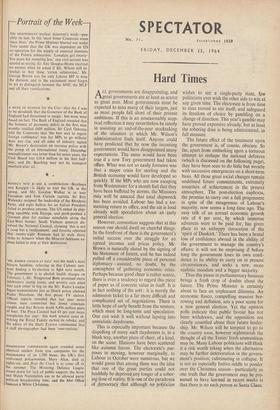Hard Times
ALL governments are disappointing, and great governments are at least as scarce as great men. Most governments must be expected to miss many of their targets, just as most people fall short of their private ambitions. If this is an unseasonably scep- tical reflection it may nevertheless be timely in assisting an end-of-the-year stocktaking of the situation in which Mr. Wilson's administration finds itself. Anyone could have predicted that by now the incoming government would have disappointed many expectations. The same would have been true if a new Tory government had taken office. What was not so easily, foreseen was that a major crisis for sterling and the British economy would have developed so quickly. If the MPs who are now escaping from Westminster for a month feel that they have been buffeted by storms, the Ministers may well be amazed that total shipwreck has been avoided. Labour has had a tor- menting return to office, and the air is loud already with speculation about an early general election.
However, convention suggests that at this season one should dwell on cheerful things. In the forefront of these is the government's initial success ' over the struggle for an agreed incomes and prices policy. Mr. Brown is naturally elated by the signing of his Statement of Intent, and he has indeed pulled off a considerable piece of personal diplomacy—assisted, no doubt, by the atmosphere of gathering economic crisis. Perhaps because good cheer is rather scarce, there is even a tendency to regard this piece of paper as of concrete value in itself. It is in fact nothing of the sort : it is merely the admission ticket to a far more difficult and complicated set of negotiations. There is little hope of early benefit from the venture, which must be long-term and speculative. One can wish it well without lapsing into unrealistic daydreams.
This is especially important because the dispelling of many such 'daydreams, is, in a bleak way,.another piece of cheer, of a kind, on the scene. Illusions have been scattered like autumn leaves. The electorate's pur- poses in moving, however marginally, to Labour in October-were numerous, but we would guess that among them was the idea that one of the great parties could not healthily be deprived any longer of a sober- ing dose'of reality. it is one of the paradoxes of democracy that although no politician wishes to see a single-party state, few politicians ever wish the other side to win at any given time. The electorate is from time to time moved to stir itself, and safeguard its freedom of choice by gambling on a change of direction. This year's gamble may have proved expensive already, but at least the sobering dose is being administered, in full measure.
The' future effect of the treatment upon the government is, of course, obscure. So far, apart from embarking upon a tortuous attempt to reshape the national defences (which is discussed on the following page), they have been seen to do little but wrestle with successive emergencies on a short-term basis. All those great social changes remain undefined future commitments, extremely uncertain of achievement in the present atmosphere. The post-election euphoria, the promise to carry out a full programme in spite of the meagreness of Labour's majority, now seems a long time ago. The easy talk of an annual economic growth rate of 4 per cent,, by which immense advances were to be paid for, has given place to an unhappy invocation of the `spirit of Dunkirk.' There has been a brutal loss of confidence abroad in the ability of the government to manage the country's affairs; it will not be surprising if before long the government loses its own confi- dence in its ability to carry on in present circumstances, and seeks a new, more realistic mandate and a bigger majority.
Thus this pause in parliamentary business brings a fresh crop of doubts about the future. The Prime Minister is certainly about to face an unpleasant dilemma. An economic fiasco, compelling massive bor- rowing and deflation, sets a poor scene for a new general election. Yet the opinion polls indicate that public favour has not been withdrawn, and the opposition are clearly unsettled about their future leader- ship. Mr. Wilson will be tempted to go to the country soon, however nightmarish the thought of all the Tories' fresh ammunition may be. Many Labour politicians will think it a risk worth taking when the alternative may be further deterioration in the govern- ment's position, culminating in collapse. It is not an especially festive riddle to ponder over the Christmas season—particularly as one truth that the government may be pre- sumed to have learned in recent weeks is that there is no such person as Santa Claus.




























 Previous page
Previous page